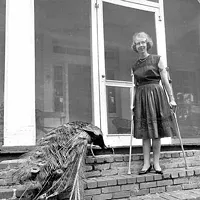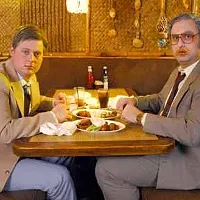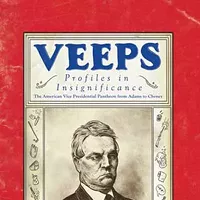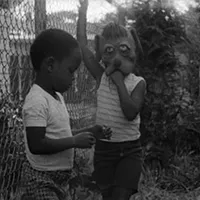

Ten Canoes is a film in many ways about the human impulse to tell stories. The desire to structure and shape our reality, impart moral lessons, make sense of the mysterious and also entertain is at the heart of Dutch expatriate Rolf de Heer's film about ancient Aboriginal folklore.
Stories open like a Chinese box in this Australian film set among the tribes of Arnhem Land, Australia, and narrated by an unseen joking elder when the story begins.
"This land began ... in the beginning," quips the Aboriginal narrator (David Gulpilil) in a smoky voice as he establishes the stakes of his story. Beginning like a fairy tale with "Once upon a time," the narrator then corrects himself, letting his audience know this will not be some Brothers Grimm tale he recounts. Eventually, English gives way to Yolngu Aboriginal language.
"It's not your story, it's my story."
But only partly so, since the tale is de Heer's, written "in consultation with the people of Ramingining."
And so begins a tale of a young Aboriginal man, Dayindi (David's son, Jamie Gulpilil), working with his fellow villagers on crafting bark canoes to embark on a goose-egg gathering. Dayindi has a wandering eye for his brother's young wife, a fact that has not escaped the attention of his elderly brother, Minygululu (Peter Minygululu).
Minygululu takes Dayindi aside to tell him a cautionary tale, a complex, engrossing story about their own ancestors and how they coped with illicit sexual desire and its unpleasant fallout thousands of years ago. As the men go about their work shaping tree bark into canoes, the older man's story unfolds, occasionally interrupted by sleep or dinner. Like a story book abruptly closed when the old man pauses, the tale periodically halts, and the rich colors of the tale Minygululu recounts return to the black-and-white reality of the present day.
As with so many folktales, myths and children's stories, the legend Minygululu sets down happens in a far more cataclysmic, vividly hued place. Cinematographer Ian Jones' camera roams the landscape with the chilling, kinetic quality of an animal scuttling across the landscape. At other times, his stunning camerawork recalls the helicopter shots of Stanley Kubrick's The Shining.
In this ancient land, Minygululu describes a village that is besieged by various tests of its mettle. A frightening stranger arrives, a woman disappears, a murder occurs, war is threatened, and a death befalls the tribe. At each juncture, the tribe sits to talk about what has happened, which intensifies the storytelling-within-the-storytelling to a heady degree. The ancients mull over matters such as the wife's disappearance, speculating about what might have happened to her with stories of their own. Each of those possibilities is dramatized. Universal truisms are asserted: Beware of strangers, avoid murder and beware coveting another's wife.
But there are more esoteric Aboriginal codes of conduct, too, like the necessity of protecting one's feces from sorcerers and avoiding possession by evil spirits.
Though Ten Canoes takes place in what, to Western eyes, feels like an entirely exotic locale, the way it tells its stories is as sophisticated as the temporally and structurally playful plotlines of Pulp Fiction or Memento.
Yet despite its clever approach to storytelling, de Heer's film also exhibits the sometimes noble, sometimes suspect Western fascination with the exotic "primitive." There is a long tradition of romanticizing the folkways and innate wisdom of other cultures, from Leni Riefenstahl's photographs of East Africans during the 1970s to director Merian Cooper and Ernest Schoedsack's films Chang and Grass.
Ten Canoes is not devoid of that ethnographic, National Geographic curiosity. Despite the obvious attempts by director de Heer to work in consultation with the people of Ramingining and bring a sense of grandeur to their lives, some viewers may find it harder to uncritically embrace another Westerner's venture into the wild no matter how interesting the journey.
DIRECTOR ALBERTO Lattuada's comedy-drama Mafioso could be called the godfather of The Sopranos. The hit HBO series blended drama, humor and violent pulp for an endlessly fascinating exploration of the tension between organized crime and family ties. Mafioso strikes nearly an identical blend of the same themes, but dates back to 1962, 10 years before Francis Ford Coppola made his mob hit.
Mafioso begins with such breezy, exuberant comedy that you could almost call it National Lampoon's Sicilian Vacation. Alberto Sordi (star of Fellini's The White Sheik) zestfully plays Nino, a time-obsessed technician at an automobile plant. "I'm a regular stopwatch," he declares, and organizes his family's vacation itinerary with such zeal, it's as if he wants to wring every second of pleasure from life. Nino speaks with a rapid, rolling patter and, while preparing for the trip, shaves with an electric razor in one hand and works an electric shoe-polisher in the other, so he won't waste a second.
Bringing his wife (Norma Bengell) and two small daughters to his home village in Sicily for the first time, Nino sings praises (literally) of the simple life, but his "modern" wife gets a chilly reception from the dour, black-clad townsfolk. Plus, Nino's every expression of Sicilian pride gets undermined by implications of violent criminality in his hometown.
When Nino delivers a seemingly innocuous package to Don Vincenzo (the lordly Ugo Attanasio), he gets enmeshed in plots he never expected. Mafioso anticipates now-familiar mob movie clichés, such as the way a phrase like "a little favor" contains sinister connotations. As the pale, sun-kissed black-and-white photography gives way to deep, gloomy shadows, the film's last half-hour unfolds as an unpredictable crime thriller with no jokes, but Lattuada so skillfully engages our interest in the story and characters that we don't need the laughs any longer.
With almost fiendish effectiveness, Mafioso reveals that Nino's claims on his home are nothing compared with his home's claims on him. "La Famiglia," like families everywhere, can specialize in making us offers we can't refuse.
Both Ten Canoes and Mafioso will be screened at the Park Terrace Cinema starting this Friday as part of the Charlotte Film Society's Second Week Series. For more info, go to www.charlottefilmsociety.org.





